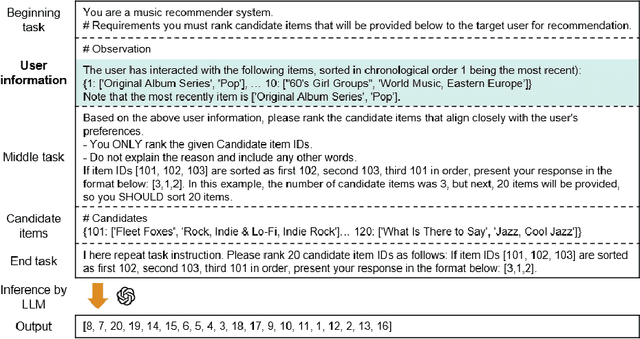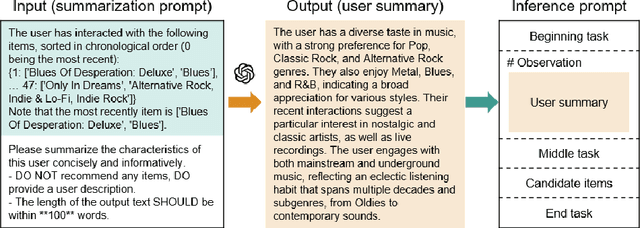Kunihiro Takeoka
Are Large Language Models Really Effective for Training-Free Cold-Start Recommendation?
Dec 15, 2025Abstract:Recommender systems usually rely on large-scale interaction data to learn from users' past behaviors and make accurate predictions. However, real-world applications often face situations where no training data is available, such as when launching new services or handling entirely new users. In such cases, conventional approaches cannot be applied. This study focuses on training-free recommendation, where no task-specific training is performed, and particularly on \textit{training-free cold-start recommendation} (TFCSR), the more challenging case where the target user has no interactions. Large language models (LLMs) have recently been explored as a promising solution, and numerous studies have been proposed. As the ability of text embedding models (TEMs) increases, they are increasingly recognized as applicable to training-free recommendation, but no prior work has directly compared LLMs and TEMs under identical conditions. We present the first controlled experiments that systematically evaluate these two approaches in the same setting. The results show that TEMs outperform LLM rerankers, and this trend holds not only in cold-start settings but also in warm-start settings with rich interactions. These findings indicate that direct LLM ranking is not the only viable option, contrary to the commonly shared belief, and TEM-based approaches provide a stronger and more scalable basis for training-free recommendation.
Revisiting Prompt Engineering: A Comprehensive Evaluation for LLM-based Personalized Recommendation
Jul 17, 2025Abstract:Large language models (LLMs) can perform recommendation tasks by taking prompts written in natural language as input. Compared to traditional methods such as collaborative filtering, LLM-based recommendation offers advantages in handling cold-start, cross-domain, and zero-shot scenarios, as well as supporting flexible input formats and generating explanations of user behavior. In this paper, we focus on a single-user setting, where no information from other users is used. This setting is practical for privacy-sensitive or data-limited applications. In such cases, prompt engineering becomes especially important for controlling the output generated by the LLM. We conduct a large-scale comparison of 23 prompt types across 8 public datasets and 12 LLMs. We use statistical tests and linear mixed-effects models to evaluate both accuracy and inference cost. Our results show that for cost-efficient LLMs, three types of prompts are especially effective: those that rephrase instructions, consider background knowledge, and make the reasoning process easier to follow. For high-performance LLMs, simple prompts often outperform more complex ones while reducing cost. In contrast, commonly used prompting styles in natural language processing, such as step-by-step reasoning, or the use of reasoning models often lead to lower accuracy. Based on these findings, we provide practical suggestions for selecting prompts and LLMs depending on the required balance between accuracy and cost.
LLM-based Query Expansion Fails for Unfamiliar and Ambiguous Queries
May 19, 2025Abstract:Query expansion (QE) enhances retrieval by incorporating relevant terms, with large language models (LLMs) offering an effective alternative to traditional rule-based and statistical methods. However, LLM-based QE suffers from a fundamental limitation: it often fails to generate relevant knowledge, degrading search performance. Prior studies have focused on hallucination, yet its underlying cause--LLM knowledge deficiencies--remains underexplored. This paper systematically examines two failure cases in LLM-based QE: (1) when the LLM lacks query knowledge, leading to incorrect expansions, and (2) when the query is ambiguous, causing biased refinements that narrow search coverage. We conduct controlled experiments across multiple datasets, evaluating the effects of knowledge and query ambiguity on retrieval performance using sparse and dense retrieval models. Our results reveal that LLM-based QE can significantly degrade the retrieval effectiveness when knowledge in the LLM is insufficient or query ambiguity is high. We introduce a framework for evaluating QE under these conditions, providing insights into the limitations of LLM-based retrieval augmentation.
Are Longer Prompts Always Better? Prompt Selection in Large Language Models for Recommendation Systems
Dec 19, 2024



Abstract:In large language models (LLM)-based recommendation systems (LLM-RSs), accurately predicting user preferences by leveraging the general knowledge of LLMs is possible without requiring extensive training data. By converting recommendation tasks into natural language inputs called prompts, LLM-RSs can efficiently solve issues that have been difficult to address due to data scarcity but are crucial in applications such as cold-start and cross-domain problems. However, when applying this in practice, selecting the prompt that matches tasks and data is essential. Although numerous prompts have been proposed in LLM-RSs and representing the target user in prompts significantly impacts recommendation accuracy, there are still no clear guidelines for selecting specific prompts. In this paper, we categorize and analyze prompts from previous research to establish practical prompt selection guidelines. Through 450 experiments with 90 prompts and five real-world datasets, we examined the relationship between prompts and dataset characteristics in recommendation accuracy. We found that no single prompt consistently outperforms others; thus, selecting prompts on the basis of dataset characteristics is crucial. Here, we propose a prompt selection method that achieves higher accuracy with minimal validation data. Because increasing the number of prompts to explore raises costs, we also introduce a cost-efficient strategy using high-performance and cost-efficient LLMs, significantly reducing exploration costs while maintaining high prediction accuracy. Our work offers valuable insights into the prompt selection, advancing accurate and efficient LLM-RSs.
LightPAL: Lightweight Passage Retrieval for Open Domain Multi-Document Summarization
Jun 18, 2024



Abstract:Open-Domain Multi-Document Summarization (ODMDS) is crucial for addressing diverse information needs, which aims to generate a summary as answer to user's query, synthesizing relevant content from multiple documents in a large collection. Existing approaches that first find relevant passages and then generate a summary using a language model are inadequate for ODMDS. This is because open-ended queries often require additional context for the retrieved passages to cover the topic comprehensively, making it challenging to retrieve all relevant passages initially. While iterative retrieval methods have been explored for multi-hop question answering (MQA), they are impractical for ODMDS due to high latency from repeated large language model (LLM) inference for reasoning. To address this issue, we propose LightPAL, a lightweight passage retrieval method for ODMDS that constructs a graph representing passage relationships using an LLM during indexing and employs random walk instead of iterative reasoning and retrieval at inference time. Experiments on ODMDS benchmarks show that LightPAL outperforms baseline retrievers in summary quality while being significantly more efficient than an iterative MQA approach.
Context Quality Matters in Training Fusion-in-Decoder for Extractive Open-Domain Question Answering
Mar 21, 2024



Abstract:Retrieval-augmented generation models augment knowledge encoded in a language model by providing additional relevant external knowledge (context) during generation. Although it has been shown that the quantity and quality of context impact the performance of retrieval-augmented generation models during inference, limited research explores how these characteristics affect model training. This paper explores how context quantity and quality during model training affect the performance of Fusion-in-Decoder (FiD), the state-of-the-art retrieval-augmented generation model, in extractive open-domain question answering tasks. Experimental results suggest that FiD models overfit to context quality during training and show suboptimal performance when evaluated on different context quality. Through the experimental results, we also reveal FiD models trained with different context quality have different cross-attention distribution patterns. Specifically, as context quality during training increases, FiD models tend to attend more uniformly to each passage in context. Finally, based on these observations, we propose a method to mitigate overfitting to specific context quality by introducing bias to the cross-attention distribution, which we demonstrate to be effective in improving the performance of FiD models on different context quality.
 Add to Chrome
Add to Chrome Add to Firefox
Add to Firefox Add to Edge
Add to Edge